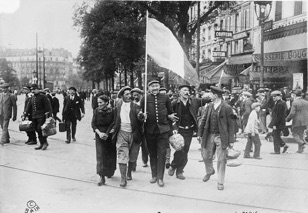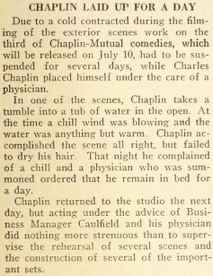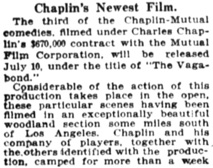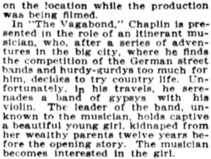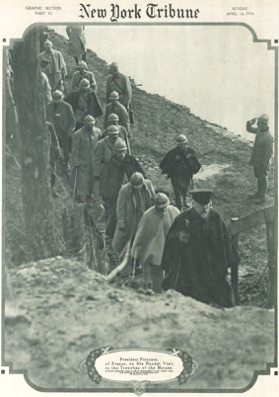The Vagabond Clippings 1/55
Washington Times, Washington D. C., June 20, 1916.
World War One. French Reservists going to R. R. station in Paris,
1910s. Bain Collection, Library of Congress
& President Poincare, of France, on His Recent Visit to the
Trenches of the Meuse.
(...) Exclusive photograph taken by official photographers
of the French Army and published by special
arrangement with the Minister of War, Graphic Section, New York Tribune, April 16, 1916
& CHAPLIN LAID UP FOR A DAY
Due to a cold contracted during the filming of the exterior
scenes on the third of Chaplin-Mutual comedies, which
will be released on July 10, had to be suspended for several
days, while Charles Chaplin placed himself under the
care of a physician.
In one of the scenes, Chaplin takes a tumble into a tub
of water in the open. At the time a chill wind was
blowing and the water was anything but warm. Chaplin
accomplished the scene all right, but failed to dry
his hair. That night he complained of a chill and a physician
who was summoned ordered that he remain in bed
for a day.
Chaplin returned to the studio the next day, but acting
under the advice of Business Manager Caulfield and
his physician did nothing more strenuous than to supervise
the rehearsal of several scenes and the construction
of several of the important sets.
(...) Motion Picture News, June 17, 1916
„Camped for more than a week“
Editorial content. „Chaplin‘s Newest Film.
The third of the Chaplin-Mutual comedies, filmed under
Charles Chaplin‘s $670,000 contract with the Mutual
Film Corporation, will be released July 10, under the title
of The Vagabond.
Considerable of the action of this production takes place
in the open, these particular scenes having been
filmed in an exceptionally beautiful woodland section some miles
south of Los Angeles. Chaplin and his company of players,
together with the others identified with the production, camped
for more than a week on the location while the production
was being filmed.
In The Vagabond, Chaplin is presented in the role of an
itinerant musician, who, after a series of adventures
in the big city, where he finds the competition of the German
street bands and hurdy-gurdys too much for him,
decides to try country life. Unfortunately, in his travels,
he serenades a band of gypsys with his violin.
The leader of the band, unknown to the musician, holds
captive a beautiful young girl, kidnaped from her
wealthy parents twelve years before the opening story.
The musician becomes interested in the girl.“
Redaktioneller Inhalt. „Chaplins neuester Film.“ Hier
gibts unter anderem einen Hinweis auf die Location
derDreharbeiten. „Ein beträchtlicher Teil der Handlung dieser
Produktion spielt im Freien, diese besonderen Szenen
wurden in einer ungewöhnlich schönen, bewaldeten Gegend
einige Meilen südlich von Los Angeles gefilmt. Chaplin
campierte mit seiner Company von Schauspielern und den
anderen, bei der Produktion Beschäftigten über eine
Woche in der Location, während die Produktion gefilmt wurde.“
Alan Nevins & Henry Steele Commager, The Pocket History
of the United States, New York 1942: „In the presidential elections
of 1916 Wilson was successful, largely because he had ,kept
us out of war.‘“
He Kept Us out of War. That´s his campaign slogan.
The fighting in Europe dominates the campaign. Woodrow Wilson campaigns for re-election on a pledge of continued neutrality
in the World War One
Election night is on November 7, 1916. The electoral vote
is one of the closest in American history – with 266 votes needed
to win, Wilson takes 30 states for 277 electoral votes, while
Hughes wins 18 states and 254 electoral votes.
After the sinking of seven U.S. merchant ships by submarines
and the publication of the Zimmerman telegram, Wilson
calls for war on Germany, which the U.S. Congress declares
on April 6, 1917.
Am 28. Juli 1914 hat der Erste Weltkrieg begonnen –
„the european war“ wird er oft in amerikanischen Zeitungen
vorerst noch genannt. Am 7. November 1916 gewinnt
US-Präsident Wilson die Wiederwahl. Sein Slogan –
He kept us out of war – ist erfolgreich. Am 6. April 1917 ruft
Wilson aber zum Krieg gegen Deutschland auf.

